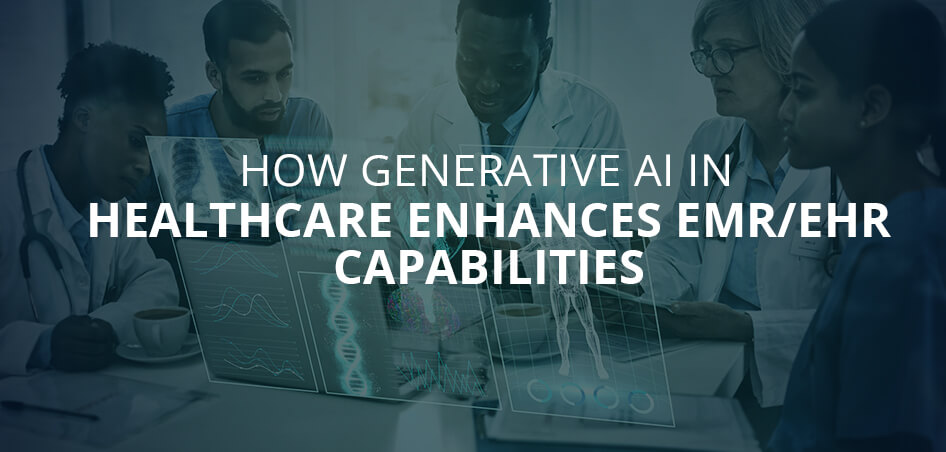
How Generative AI in Healthcare Enhances EMR/EHR Capabilities
In the world of healthcare, we've seen remarkable advancements in medical imaging and diagnostic tools, leading to a massive influx of data on patient health. However, when it comes to using electronic health records (EHRs) in large healthcare systems, things get tricky. These systems can be rigid, not very user-friendly, and expensive to customize. What's more, they struggle to efficiently manage various aspects of patient care, administrative processes, and more. The challenge lies in finding a way to bridge the gap between these systems and the real-life procedures in healthcare. One possible solution is to design a more user-friendly EHR system that seamlessly integrates into existing workflows. But here's the catch – developing such integrated systems is a time-consuming task.
This is where Generative AI comes into picture as a game-changer for health IT trends. It's simplifying the management of patient records and making data handling and retrieval a breeze. Plus, it's boosting the compatibility of different healthcare systems, making it easier for them to share data. What's surprising is that Generative AI is not only helping with accurate diagnoses and can even predict potential health issues but also acting a smart assistant for healthcare organisation in streamlining the whole process.
Generative AI and the future of EHR
You know, innovation is going to keep pushing AI's role in handling medical records. Right now, generative AI is already doing some amazing stuff, like crunching massive data sets to make things in healthcare run smoother, speed up digital health efforts, make care more personalized, and even help doctors make better decisions. As the healthcare world embraces tech more and more, we'll see the job of data scientists changing, and organizations will put even more focus on data. This is all good news for health tech talent staffing too. It means that over time, your experience with healthcare technology trends and the outcomes will get better. And guess what? A big part of that improvement will be thanks to the valuable data they collect. And just to give you a taste of the perks, here are a few benefits of using generative AI in electronic medical records (EMR) software:
Optimized Workflows
Bringing generative AI into your current electronic health record (EHR) software has some fantastic advantages. It can take over tasks like paperwork, coding, and even the less exciting administrative work, which means doctors can invest more of their time and attention in patient care.
Enhanced Data Collaboration
AI isn't just about automation; it's also a master at secure data sharing. It uses advanced techniques like federated learning and differential privacy to exchange valuable insights and knowledge between different healthcare organizations without ever exposing sensitive patient information
Magic in Medical Imaging
Generative AI, with tools like Generative Adversarial Networks (GANs), can do wonders for medical images. It helps create higher-quality images, which is a game-changer when you're dealing with limited data. It sharpens image resolution and plays a vital role in training AI algorithms.
Speaking Your Language
Generative AI is like a language maestro. It can translate structured EHR data into easily digestible reports and summaries. This simplifies the process for healthcare professionals to navigate through a sea of patient information, fostering better communication and coordination among healthcare teams.
Smart Predictions and Decision Support
Generative AI is here to offer some serious predictive power. EHR systems can utilize AI models to generate personalized predictions for individual patients based on their current health status and medical history. It's like having a crystal ball to guide healthcare decisions and improve patient outcomes.
So, what does this mean for your healthcare organisation?
Well, Artificial intelligence, machine learning and natural language processing (NLP) come with some nifty features that can make a big difference. They can help health IT companies documenting patients' unique medical journeys, dig through massive EHR data for important records, measure how satisfied patients are, and more.
Combine these machine learning models with NLP, and you've got a team that can turn spoken words from voice recognition systems into text. They can even be trained to handle the tons of patient data, like treatment details, equipment used, and which doc patients saw. Plus, this data can be neatly organized based on individual patients, their ailments, and the treatments they've received. This makes searching for documents and info in those gigantic databases a whole lot easier.
Conclusion
Overall, generative AI opens doors for healthcare providers to harness data-driven insights and offer more personalized care plans. Furthermore, the application of generative AI has the capacity to enhance the quality of information stored in Electronic Health Records (EHRs). Often, EHRs suffer from disorganization and a lack of standardization, which can hinder physicians in their quest for specific data. Generative AI comes to the rescue by automatically organizing EHR data, making it more accessible and well-structured for healthcare professionals. Despite the challenges and possible drawbacks, the effective and ethical integration of AI in medicine holds promise for healthcare technology companies in boosting the efficiency and precision of their healthcare system.





 Back
Back 21
21  104
104